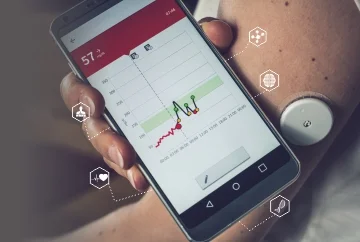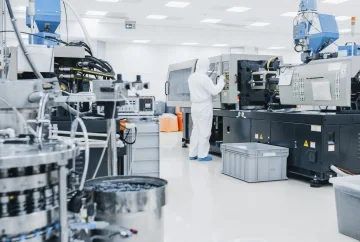For a long time, medical companies relied on their sales rep's meetings with customers to market their products, services, and innovations. But the current situation has drastically changed their customers' expectations and needs. Forrester Research predicts that by the year 2023, sales for medical healthcare eCommerce in the US alone will reach $1.8 trillion. Thus, to provide an extraordinary buying experience to the customers, the medical device manufacturers need to adopt an omnichannel strategy combining D2C and B2B eCommerce for selling their medical products and services.
Covid-19 has put the medical industry at the forefront with massive demands for diagnostic tests, ventilators, PPE kits, and other medical supplies. We saw how the industry went to extraordinary lengths to meet these surging demands. And this would not have been possible without med-tech leaders exploring creative solutions in the digital space.
Reasons Behind the Rise of eCommerce Adoption in Med Device Manufacturing
Nevertheless, this change was impending, as even before the pandemic, in-person visits of sales reps had already begun to decline as only 54% of physicians reported to have physically met them in their office. In response to the gravity of the situation, medical device manufacturers have begun transitioning into b2b eCommerce massively.
This shift from physical sales to a b2b eCommerce model has several benefits as listed below:
- Frictionless Customer Experience
- Improved Sales
- Buyer Behavior Insights
- Rise of D2C Model Due to Pandemic
- Emerging Need for Salesforce Alignment
- Easy Expansion to Serve Newer Geographies
- Quicker Time to Market
- Inbound Inquiry Driven Sales
- Improved Operational Efficiency and Effectiveness
- Reduction in Operational Costs
- Marketing Enablement
- Elimination of Errors Due to Manual Operations
- Timely Delivery Tracking
- Real-time Inventory Data
- Improved Brand Awareness
- Access to Data & Analytics
- Control on Sales Catalogue
- Integration with Other Systems and Platforms
- Easy to Scale Up or Scale Down
- Multiple eCommerce Models
- Customer Feedback Loop
- Localization
- Faster and Timely Information Exchange
- Customer Empowerment
- CPQ Modernization
#1 Frictionless Customer Experience
One of the biggest challenges that the HCPs and patients face while interacting with a med device manufacturer company is its extensive fragmentation. These companies often go through mergers and acquisitions, leading to several fragmented and disconnected systems. The outdated legacy systems which aren't equipped to deal with these mergers add to the woes and create multiple user experience for the same medical device manufacturer.
An omnichannel eCommerce solves this problem by making use of AI and automation, combining, all the entities under a single umbrella to create a unified customer experience.
#2 Improved Sales
The traditional commerce model in the medical manufacturing industry is costly, time-consuming, and less efficient. But, the new omnichannel eCommerce model has massive potential for increasing sales of medical devices and services. A case study by Boston Consulting shows how a medical company in Europe unlocked $5 Billion by adopting an omnichannel strategy combining B2B and D2C.
A key component of omnichannel eCommerce is digital marketing. By utilizing digital marketing, medical companies can understand the customers' expectations and cater to their needs accordingly, eventually gaining customer loyalty and increasing sales.
#3 Buyer Behavior Insights
Today, 58 percent of consumers prefer their healthcare interactions to be digital. As the COVID-19 pandemic is changing how the world functions, consumer behaviour is changing continuously at a staggering pace. The healthcare industry needs to keep a tab on the everchanging consumer behaviour pattern to stay ahead in the competition.
Today, B2B omnichannel eCommerce solutions use AI and Big data analytics to help medical equipment manufacturers to understand the buyer's persona, buying patterns, needs, and wants. These insights enable the manufacturers to meet their customers' expectations and enhance their buying experience.
#4 Rise of D2C Model Due to Pandemic
Due to the COVID-19 pandemic, the patients took a proactive approach to their health and healthcare needs. While the pandemic put movement restrictions at several places, the consumer still had access to anything and everything through their mobile devices. This paradigm shift has necessitated the medical device manufacturers to adopt a direct-to-customer eCommerce model that has proven profitable for several brands. This model makes it easier for the brands to let customers buy directly from them via eCommerce sites, mobile phone apps, etc.

#5 Emerging Need for Salesforce Alignment
In the traditional healthcare setup, sales reps were equipped with sales involving in-person visits and focused on representing medical devices and products. However, omnichannel eCommerce has changed this approach from product-centric to customer-centric. The result is a massive skill gap in the existing salesforce. Research estimates that 64% of medical device manufacturing companies have launched programs to help their sales reps and executives to enhance their "inside sales" capabilities.
These programs include equipping them with online-communication tools, various forms of digital content, and remote selling. To gain the most out of this omnichannel strategy, the salesforce needs to be equipped with skills to customize an approach for each client or prospect instantaneously via digital mediums.
#6 Easy Expansion to Serve Newer Geographies
One of the biggest lessons the SARS–CoV–2 pandemic has taught us is how a well-coordinated medical community can control a global health crisis. The current healthcare industry has to be robust, dynamic, and responsive to national and international boundaries. Omnichannel eCommerce makes it easier for medical device manufacturers to expand and serve various geographies and nations.
#7 Quicker Time to Market
An omnichannel strategy is a win-win situation for patients, HCPs, and medical marketers alike. Consumers are happy because they receive a seamless experience, while marketers are happy to attract and retain more customers. B2B eCommerce opens doors for the sales rep to reach a wider range of audiences faster. Sales and marketing teams are moving to online channels to market their medical products and services, resulting in a quicker time to market. The hassles of traditional marketing, such as in-person visits, are considerably reduced. As soon as medical products or services are launched or updated, they can be available to buy via online channels.
#8 Inbound Inquiry Driven Sales
The easy accessibility and abundance of information nowadays have made the customer well-informed. This smart customer is at the heart of sales. They are clear about their wants, goals, and interest. Customers and patients today prefer connecting through omnichannel call-center technologies. Be it through the web, email, mobile phone apps, texts, calls, or email, and they are exploring all means to inquire about the medical equipment or services they require. To gain an edge in the contemporary world, medical equipment manufacturers need to accommodate the customer's above needs.
#9 Improved Operational Efficiency and Effectiveness
The Healthcare sector inherently involves a lot of paperwork with manual workflows for almost everything, whether inside sales, administrative tasks, or financial functions. This makes operations repetitive, time-consuming, costly, error-prone, and inefficient. By automating complex operational processes through intelligent technologies like AI, Data Analytics, and Blockchain, medical equipment manufacturers can reduce the time taken by manual, repetitive activities and eliminate redundant operations. Thus, omnichannel eCommerce can truly help streamline processes, whether manufacturing, procurement, or automated billing, thereby reducing processing errors and increasing operational efficiency and effectiveness.
#10 Reduction in Operational Costs
Adopting an eCommerce omnichannel strategy also means a digital shift in functions and operations. With automated and smart technologies, supply chain managers and the sales force can easily track medical device inventory accurately in real-time. They can also offer greater visibility to the customer, have more accurate forecasting capabilities, and analyze demand and supply patterns based on historical data. These streamlined inventories minimize errors and waste, enable timely data-driven decision-making, reduce supply and labour costs and significantly lower transactional and operational costs.
#11 Marketing Enablement
The key to a successful B2B omnichannel eCommerce strategy is digital marketing. The healthcare industry was dependent on general marketing until a while ago, but now it embraces the digital means to market its medical products and services. To reap the benefits, marketing teams in the medical device industry need to enable themselves with revolutionary marketing trends such as:
- Affordable, time-saving marketing solutions for efficiency
- Optimization of the product range for mobile devices for better customer experience
- Search engine optimization to reach out to a wide range audience
- Personalized healthcare marketing to attract the right customer





